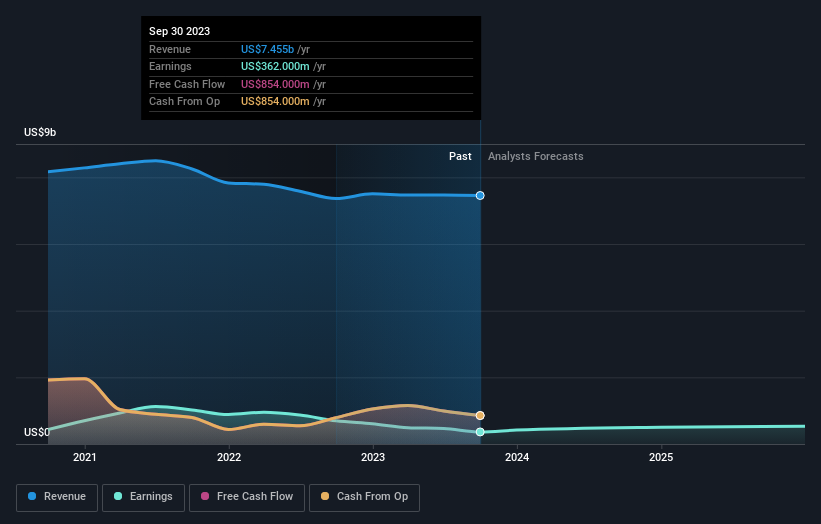Institutional investors control 80% of Genworth Financial, Inc. (NYSE:GNW) and were rewarded last week after stock increased 6.0%
Key Insights
Institutions' substantial holdings in Genworth Financial implies that they have significant influence over the company's share price
The top 9 shareholders own 50% of the company
A look at the shareholders of Genworth Financial, Inc. (NYSE:GNW) can tell us which group is most powerful. With 80% stake, institutions possess the maximum shares in the company. Put another way, the group faces the maximum upside potential (or downside risk).
And as as result, institutional investors reaped the most rewards after the company's stock price gained 6.0% last week. The gains from last week would have further boosted the one-year return to shareholders which currently stand at 25%.
In the chart below, we zoom in on the different ownership groups of Genworth Financial.
Check out our latest analysis for Genworth Financial
What Does The Institutional Ownership Tell Us About Genworth Financial?
Institutions typically measure themselves against a benchmark when reporting to their own investors, so they often become more enthusiastic about a stock once it's included in a major index. We would expect most companies to have some institutions on the register, especially if they are growing.
As you can see, institutional investors have a fair amount of stake in Genworth Financial. This suggests some credibility amongst professional investors. But we can't rely on that fact alone since institutions make bad investments sometimes, just like everyone does. When multiple institutions own a stock, there's always a risk that they are in a 'crowded trade'. When such a trade goes wrong, multiple parties may compete to sell stock fast. This risk is higher in a company without a history of growth. You can see Genworth Financial's historic earnings and revenue below, but keep in mind there's always more to the story.
Investors should note that institutions actually own more than half the company, so they can collectively wield significant power. We note that hedge funds don't have a meaningful investment in Genworth Financial. Looking at our data, we can see that the largest shareholder is BlackRock, Inc. with 15% of shares outstanding. With 12% and 6.6% of the shares outstanding respectively, The Vanguard Group, Inc. and Dimensional Fund Advisors LP are the second and third largest shareholders. In addition, we found that Thomas McInerney, the CEO has 0.9% of the shares allocated to their name.
We also observed that the top 9 shareholders account for more than half of the share register, with a few smaller shareholders to balance the interests of the larger ones to a certain extent.
While it makes sense to study institutional ownership data for a company, it also makes sense to study analyst sentiments to know which way the wind is blowing. There is a little analyst coverage of the stock, but not much. So there is room for it to gain more coverage.
Insider Ownership Of Genworth Financial
While the precise definition of an insider can be subjective, almost everyone considers board members to be insiders. Company management run the business, but the CEO will answer to the board, even if he or she is a member of it.
Insider ownership is positive when it signals leadership are thinking like the true owners of the company. However, high insider ownership can also give immense power to a small group within the company. This can be negative in some circumstances.
Our most recent data indicates that insiders own some shares in Genworth Financial, Inc.. It is a pretty big company, so it is generally a positive to see some potentially meaningful alignment. In this case, they own around US$47m worth of shares (at current prices). It is good to see this level of investment by insiders. You can check here to see if those insiders have been buying recently.
General Public Ownership
With a 18% ownership, the general public, mostly comprising of individual investors, have some degree of sway over Genworth Financial. This size of ownership, while considerable, may not be enough to change company policy if the decision is not in sync with other large shareholders.
Next Steps:
It's always worth thinking about the different groups who own shares in a company. But to understand Genworth Financial better, we need to consider many other factors. For example, we've discovered 2 warning signs for Genworth Financial that you should be aware of before investing here.
If you would prefer discover what analysts are predicting in terms of future growth, do not miss this free report on analyst forecasts.
NB: Figures in this article are calculated using data from the last twelve months, which refer to the 12-month period ending on the last date of the month the financial statement is dated. This may not be consistent with full year annual report figures.
Have feedback on this article? Concerned about the content? Get in touch with us directly. Alternatively, email editorial-team (at) simplywallst.com.
This article by Simply Wall St is general in nature. We provide commentary based on historical data and analyst forecasts only using an unbiased methodology and our articles are not intended to be financial advice. It does not constitute a recommendation to buy or sell any stock, and does not take account of your objectives, or your financial situation. We aim to bring you long-term focused analysis driven by fundamental data. Note that our analysis may not factor in the latest price-sensitive company announcements or qualitative material. Simply Wall St has no position in any stocks mentioned.


